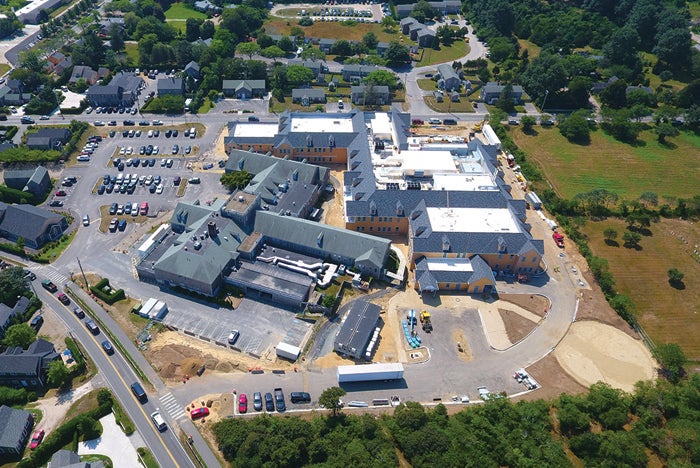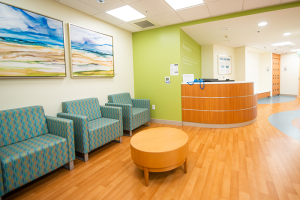Partners HealthCare undergoes systemwide resiliency assessment

Massachusetts-based Nantucket Cottage Hospital is being built to withstand 185-mph winds.
Photo courtesy of Nantucket Cottage Hospital
Nantucket (Mass.) Cottage Hospital (NCH) is in the final stretch of its replacement hospital project. The hospital broke ground on the phased project in July 2017, and will wrap up final site work in early 2019. Once it’s completed, the hospital will unveil a new, 14-bed, 106,000-square-foot facility designed to adhere to some of the strictest hurricane codes in the country.
“It’s one thing to see a nicely painted wall, and it does matter to us very much to give our patients and our staff the best possible experience we can have in the [time] that remains for us to work in this building,” says Margot Hartmann, M.D., president and CEO of NCH. “But we’re living on borrowed time. Behind the walls, the infrastructure — the electronics, the plumbing, the ventilation, the oxygen, the air, suction and all of the things that make a hospital technically a hospital — are struggling.”
Because of NCH’s particular setting — on an island and 30 miles off the coast — the small-town hospital built in 1957 opted to design according to Florida state codes rather than Massachusetts ones. Florida requires structures to withstand 185-mph winds, while Massachusetts sets the standard at 150 mph. The building will even exceed codes set by the Centers for Medicare & Medicaid Services.
Building plans for NCH include mesh-
fortified concrete footings, redundant systems and special water and vapor barriers to protect against the type of hurricanes that have devastated cities across the country in recent years.
The new hospital also will have enough storage for food to last seven to 10 days and generator fuel for several days. The ability to remain in place is a critical need when natural disasters limit boating ability to and from Nantucket.
Although the hospital sits on an island and is certainly being built to meet the demands of its location, it is not an island unto itself. This is especially true when it comes to its goal to produce a resilient facility.
NCH is part of the larger Massachusetts-based Partners HealthCare, which is in the middle of a systemwide evaluation of its network of facilities. The evaluation is squarely focused on resiliency.
Partners HealthCare was founded in 1994 by Brigham and Women’s Hospital, and Massachusetts General Hospital. Today, the nonprofit health care system includes 14 more members ranging from community and specialty hospitals to community health centers and physician networks.
In 2014, Partners’ leadership determined that climate change and the increase in inclement weather posed a significant risk to its network and set out to evaluate the range of potential impact this could have on its more than 30 facilities and various medical services. They divided the initiative into three phases.
Phase 1 included developing climate scenarios and hazard assessments for all campuses in the system.
In Phase 2, the system focused on conducting a vulnerability assessment of critical facilities and clinical operations.
During these two phases, Partners outlined a summary of vulnerability and exposure for each risk using three timeframes: the present, 2030 and 2070.
Each campus within the Partners network prepared a resilience assessment using the Department of Health & Human Services’ Sustainable and Climate-Resilient Heath Care Facilities Toolkit checklists. The results from individual campuses were aggregated and entered into a master checklist to help clearly identify key vulnerabilities within the system.
Phase 3, the current phase, involves prioritizing capital resources and developing implementation plans, operations enhancements and long-term adaptation efforts. Operations enhancements and deferred-maintenance upgrades will help to address 2030 challenges.
However, more aggressive investments in high-performance, resiliently designed health care facilities — such as the NCH project — are required to meet the needs of 2070.




